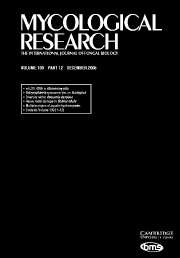No CrossRef data available.
Article contents
Adaptations of potential ecological significance to Pestalotiopsis neglecta
Published online by Cambridge University Press: 01 June 2000
Abstract
A germination inhibitor in the spore matrix of Pestalotiopsis neglecta was strongly inhibitory to other mitosporic fungi, especially coelomycetes. Germination of conidia of P. neglecta was enhanced by an exogenous source of certain carbohydrates, especially pectin but also some sugars. Light was not important for germination or growth, and was not essential for reproduction, although the number of acervuli trebled when light intensity was increased from 210 μmol m−2 s−1 to 300 μmol m−2 s−1. The possible significance of these adaptations in the ecology of P. neglecta is discussed.
- Type
- Research Article
- Information
- Copyright
- © The British Mycological Society 2000


